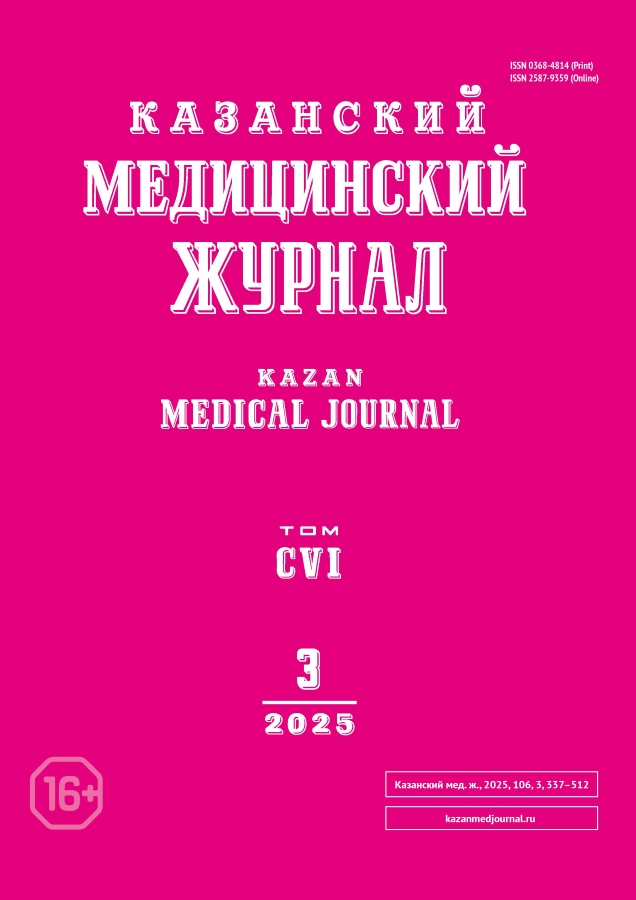Thymoanaleptic Properties of Novel Synthesized Heterocyclic Derivatives of α-cyanothioacetamide
- Authors: Subbota V.S.1, Bibik Е.Y.1, Krivokolisko S.G.2
-
Affiliations:
- Saint Luka Lugansk State Medical University
- Lugansk Vladimir Dahl State University
- Issue: Vol 106, No 3 (2025)
- Pages: 407-413
- Section: Experimental medicine
- Submitted: 13.09.2024
- Accepted: 10.12.2024
- Published: 29.04.2025
- URL: https://kazanmedjournal.ru/kazanmedj/article/view/635994
- DOI: https://doi.org/10.17816/KMJ635994
- EDN: https://elibrary.ru/TQVZGC
- ID: 635994
Cite item
Abstract
BACKGROUND: Antidepressants are associated with various adverse effects, largely due to their broad activity profiles involving central and peripheral biological targets.
AIM: To investigate the thymoanaleptic effects of novel synthesized α-cyanothioacetamide derivatives using Porsolt’s forced swim test.
MATERIAL AND METHODS: Among 340 synthesized compounds, in silico biological screening identified 8 with potential antidepressant activity. Porsolt’s forced swim test was conducted in 110 outbred white rats divided into 11 groups: the control group; comparison group 1 (amitriptyline, 5 mg/kg); comparison group 2 (fluoxetine, 5 mg/kg); and eight experimental groups (test compounds, 5 mg/kg). Statistical analysis was performed using Microsoft Excel 2019, an online calculator for statistical testing, and Statistica 10.0. Data homogeneity and significance were assessed using the coefficient of variation and the Wilcoxon T test.
RESULTS: Compounds d02-20, AZ-127, and AZ-128 significantly reduced the immobility time and increased the swimming and jumping behaviors compared with the control group. The compounds showed greater efficacy in jumping activity than amitriptyline and fluoxetine. No significant differences in swimming or immobility indicators were found between the experimental groups and those treated with the reference drugs.
CONCLUSION: The tested α-cyanothioacetamide derivatives indicated thymoanaleptic activity in Porsolt’s forced swim test in rats.
Full Text
About the authors
Vladislav S. Subbota
Saint Luka Lugansk State Medical University
Author for correspondence.
Email: projorik56@gmail.com
ORCID iD: 0009-0007-6050-4031
SPIN-code: 7108-9545
Assistant Lecturer, Depart. of Fundamental and Clinical Pharmacology
Russian Federation, 1g, qr 50th anniversary of the defense of Lugansk, Lugansk, 291045Еlena Yu. Bibik
Saint Luka Lugansk State Medical University
Email: helen_bibik@mail.ru
ORCID iD: 0000-0002-2622-186X
SPIN-code: 9832-4659
Dr. Sci. (Medicine), Professor, Dean, Faculty of Pharmacy, Head of Depart., Depart. of Fundamental and Clinical Pharmacology
Russian Federation, 1g, qr 50th anniversary of the defense of Lugansk, Lugansk, 291045Sergey G. Krivokolisko
Lugansk Vladimir Dahl State University
Email: ksg-group-lugansk@mail.ru
ORCID iD: 0000-0001-9879-9217
SPIN-code: 7682-4986
Dr. Sci. (Chemistry), Professor, Senior Research Associate, Chimex Research Institute
Russian Federation, Lugansk, 291034References
- Davydov AT, Petrova NN, Litvintsev SV, et al. Modern antidepressants, their role and place in psychiatric and general medical practice. Reviews of clinical pharmacology and drug therapy. 2007;5(2):49–62. (In Russ.) EDN: IARNPB
- Vazagaeva TI, Akhapkin RV, Alexandrovsky YuA. The role of the brain neurotrophic factor in the occurrence of antidepressant effects in the treatment of depression. Bulletin of the Russian Academy of Medical Sciences. 2019;74(1):20–28. doi: 10.15690/vramn1107 EDN: SKADPF
- Miftakhova AF, Nikitina IL, Gabidullin RA. Study of the mechanism of antidepressant action of a new derivative of 1-(thietanyl-3) imidazoles in neuropharmacological interaction tests. Medical Bulletin of Bashkortostan. 2021;16(1):52–57. EDN: IONIZO
- Bibik EYu, Nekrasa IA, Demenko AV, et al. Features of the effect of individual tetrahydropyrido derivatives[2,1-b][1,3,5]thiadiazine on the effects of levodopa in the tail suspension test. Kuban Scientific Medical Bulletin. 2020;27(34):65–77. doi: 10.25207/1608-6228-2020-27-3-65-77 EDN: HFOJPI
- Osolodkin DI, Kozlovskaya LI, Dueva EV, et al. Inhibitors of Tick-Borne Flavivirus Reproduction from Structure-Based Virtual Screening. ACS Medicinal Chemistry Letters. 2013;4(9):869–874. doi: 10.1021/ml400226s EDN: RFQNML
- Bibik EYu, Yaroshevskaya OG, Devdera AV, et al. Search for drugs with anti-inflammatory activity among tetrahydropyrido[2,1-b][1,3,5]thiadiazine derivatives. Chemical and Pharmaceutical Journal. 2017;51(8):16–19. doi: 10.1007/s11094-017-1669-1 EDN: ZEHMXD
- Bibik EYu, Saphonova AA, Yeryomin AV, et al. Study of analeptic activity of tetrahydropyrido [2,1-b] [1,3,5] tiadiazine derivatives. Research Result: Pharmacology and Clinical Pharmacology. 2017;3(4):20–25. doi: 10.18413/2313-8971-2017-3-4-20-25 EDN: XVJGJV
- Bibik EYu, Krasov IA, Demchenko AV, et al. The use of adaptive technology in the production of tetrahydropyride[2,1-b][1,3,5]thiadiazine. Bulletin of Siberian Medicine. 2019;18(3):21–28. doi: 10.20538/1682-0363-2019-3-21-28 EDN: PMQJSN
- Rice WG, Turpin JA, Schaeffer CA, et al. Evaluation of Selected Chemotypes in Coupled Cellular and Molecular Target-Based Screens Identifies Novel HIV-1 Zinc Finger Inhibitors. Journal of Medicinal Chemistry. 1996;39(19):3606–3616. doi: 10.1021/jm960375o
- Norman DD, Ibezim A, Scott WE, et al. Autotaxin inhibition: Development and application of computational tools to identify site-selective lead compounds. Bioorganic & Medicinal Chemistry. 2013;21(17):5548–5560. doi: 10.1016/j.bmc.2013.05.061 EDN: YDTWYH
- Bunyatyan ND, Vasiliev AN, Verstakova OL, et al, editors. Guidelines for conducting preclinical studies of medicines. Moscow: Grif i K; 2012. 944 p. (In Russ.) EDN: SDEWMP
- Nekrasa IA. Evaluation of the antidepressant, adaptogenic and analeptic effect of individual tetrahydropyrido[2,1-b][1,3,5]thiadiazine derivatives: a review of the results of our own research. International Scientific Research Journal. 2023;134(8). doi: 10.23670/IRJ.2023.134.133 EDN: CPUCEF
- Garibova TL, Kraineva VA, Voronina TA. Behavioral experimental models of depression. Pharmacokinetics and Pharmacodynamics. 2017;(3):14–19. EDN: ZREBXJ
- Borozdenko DA, Khovanova SS, Kiseleva NM, Negrebetsky VV. Modeling of depression. Russian Medical Journal. 2019;25(3):176–180. doi: 10.18821/0869-2106-2019-25-3-176-180 EDN: BRBGZU
- Waldman EA, Kraineva VA, Kotelnikova SO, Sadovsky MS. The “learned helplessness” model in rats: possibilities and limitations in assessing a depressive-like state and effects of antidepressants. Biomedicine. 2021;17(2):22–34. doi: 10.33647/2074-5982-17-2-22-34 EDN: OTOIHI
Supplementary files







